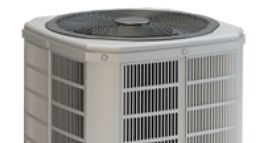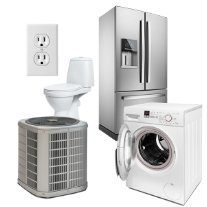Home maintenance is more than just a point of pride. It’s also a good way to save money and time. But what kind of home maintenance should you focus on? The National Home Service Contract Association (NHSCA) asked professional Service Contractors what they thought. Use this guide that we put together to give your home an expert touch.
HVAC System Home Maintenance
HVAC systems are expensive to replace. In fact, the average cost to install a new HVAC system is around $10,000. But sometimes, it can begin to creep beyond $10,000. As you go through your home maintenance checklist, consider these top three home maintenance tips for your HVAC system.
1. Check and change your air filter
Many of the surveyed Service Contractors had check and change your air filter near the top of their list of recommendations. All of the Service Contractors recommended changing your air filter every 1–3 months, with many encouraging a monthly change.
When you change your filter, be sure that the arrow is facing the correct direction. The correct direction is always toward the furnace. You can even draw an arrow on your filter housing with permanent marker to remind you. For a step-by-step guide for replacing your filter, check out our article on replacing dirty filters.
2. Keep your outdoor air conditioning unit free of debris
It can be easy to forget to keep your outdoor air conditioning unit free of debris. This includes grass clippings, leaves, and even animal nests. When your outdoor unit has debris around it, it restricts airflow. This forces the air conditioner to work harder and less efficiently. This can lead to damage down the line.
But keeping your A/C clear of debris is pretty easy. Sweep away leaves and dirt with a broom, then use a garden hose to spray the coils down. Be sure to do this especially after mowing your lawn. Grass clippings can easily get caught and bog your unit down.
3. Don’t DIY
YouTube has made it easy for people to get DIY advice. But Service Contractors don’t recommend the DIY route for HVAC systems.
That’s because your HVAC system is extremely complex. While the above two tips are simple things Service Contractors recommend you do yourself, they strongly recommend you leave more complex tasks to them, the professionals.
Don’t try to do HVAC work based on videos you find yourself. Doing so can cause even more damage and cost you more money than it must. It can also be dangerous.
Plumbing System Home Maintenance
We usually don’t think much about plumbing systems until something goes wrong. To keep things from going wrong, add these items to your home maintenance schedule.
1. Drain your water heater at least once a year
For some homeowners, the water heater is the bane of their existence. But most people don’t know that you need to drain your water heater to keep it running well. Surveyed Service Contractors recommended that you drain your water heater at least once a year.
Draining your water heater prevents mineral build up. This buildup can harm your tank, heating elements, and pipes, making the water heater run less efficiently and shortening its life span.
To learn how to drain your water heater, use our step-by-step guide on how to drain your water heater and lengthen its life.
2. Don’t flush those wipes!
One of the biggest plumbing issues Service Contractors see is people flushing things down their toilets they shouldn’t be flushing. The biggest culprit is wipes. Surveyed Service Contractors strongly recommend that you never flush wipes down the toilet, even if they say they’re flushable. Wipes are one of the leading causes of costly and inconvenient plumbing problems.
Along with wipes, here are some other commonly flushed items that you should never, ever flush.
- Kitchen paper towels
- Baby wipes
- Feminine hygiene products (even if they claim to be flushable)
3. Winterize your outside hose faucets
When it gets cold, your pipes can freeze if you didn’t properly winterize your outdoor hose faucets (bibs). This can cause pipe bursts, which can cause flooding and even structural damage. But it’s pretty easy to winterize your hose faucets.
- Disconnect any hoses attached to the faucet, and let the hose drain. Store the hose indoors or in a shed to prevent it from freezing.
- If your home has a dedicated valve for outdoor water supply, turn that valve off (if not, skip to Step 3). Then, open (turn on) your outdoor faucet and let the remaining water drain. Leave the faucet open all winter to reduce any pressure caused by residual frozen water.
- Cap your hose faucets with insulating covers. Different faucets have different covers, so check your manufacturer’s instructions for which kinds of covers yours needs.
If you notice that a pipe is frozen already, use our guide to thaw it out the right way.
4. Don’t put this stuff down your drain
Much like with toilets, some homeowners put certain things down the drain that they shouldn’t. This is especially tempting when you have a garbage disposal. But disposal or not, here are four things you should never put down your drain.
- Egg shells
- Coffee grounds
- Grease
- Starchy-food waste (potatoes & rice)
These items can easily clog your pipes. And the farther down the line they clog your pipes, the harder and more expensive it gets to fix it. Instead of putting these items down the drain, consider different options.
For example, egg shells, coffee grounds, and starchy-food waste are compostable. And you should keep a dedicated grease jar to dispose of old grease in the trash after it congeals. When all else fails, just throw it in the trash, not down the drain.
Kitchen Appliances Home Maintenance
For major home appliances, Service Contractors had two big overarching suggestions. Make these suggestions a part of your home maintenance plan going forward.
1. Keep things clean!
Perhaps the biggest cause of appliance problems has to do with cleanliness. The cleaner you keep your appliances, the better they work and the longer they last. Here are some of the more popular cleaning tips from professional Service Contractors.
- Keep your stovetop and microwave clean from grease. Grease buildup can cause important components to fail over time, which can require an expensive replacement.
- Clear dust and pet dander from your refrigerator’s condenser coils. Your fridge’s condenser coils are either under your fridge or on the back of it. Dust and pet hair can clog these coils. Clogged coils can’t release stored heat, which can damage your refrigerator and spoil your food. Simply vacuuming the coils can extend its life. If you have pets, aim to clean your coils every six months. If you don’t, a yearly cleaning should do.
- Clean your dryer vent. Your dryer vent isn’t the same as your lint trap. The dryer vent expels water vapor and lint outside of your home. It connects to the back of your dryer typically. Surveyed Service Contractors recommend that you vacuum all entry and exit points on your dryer once a year. This includes the vent on the outside of your house.
And here’s an additional tip we can offer you from experience: If you have an electric oven, check the bake element after every time you use it. It’s easy to forget how much things in the oven can drip, even if you put aluminum foil on the racks. When food drips on the baking element and you continue to use it, it can cause the baking element to disintegrate and stop working entirely, which can ruin your dinner plans (ask me how I know).
After the oven is cool, if you notice any caked-on gunk, just take a warm rag and dish soap to clean the baking element.
2. Don’t overfill your refrigerator or freezer
A common call Service Contractors get is that the fridge or freezer doesn’t work. In addition to dirty condenser coils, overfilling is a common cause. When there are too many items in your fridge or freezer, air can’t circulate. This means that some spots will stay cool while others will get too warm.
Home Warranty + Home Maintenance = Big Savings

These tips for home maintenance can make home maintenance more affordable. But someday, even with the best maintenance, your home’s systems and appliances will break down. Having a Home Service Plan (aka home warranty) from 2-10 Home Buyers Warranty (2-10) before that day comes can save you stress.
A 2-10 Home Warranty can protect major systems and appliances against routine wear and tear. When you have a home warranty, rather than paying the full out-of-pocket cost up front, you pay a much smaller Service Fee. We send a qualified, approved Service Contractor to diagnose the problem, covering the costs for qualified repairs or replacements (up to the home warranty’s limits, which we provide to you transparently). A home warranty complements your home maintenance.
Systems and appliances rarely break down on schedule, and those breakdowns are expensive and inconvenient. A 2-10 Home Warranty helps you anticipate the unexpected and makes protecting your home more affordable.









